North Korea Claims It Developed MERS Preventive Medication Despite Poor Health Care System

Medical researchers around the world have long struggled to get funding for the development of a MERS vaccine, but North Korea has claimed it developed a preventive drug almost two decades ago. State media announced a domestically produced medicine developed in the 1990s has the ability to prevent immunological disorders such as Middle East respiratory syndrome (MERS), severe acute respiratory syndrome (SARS) and Ebola virus disease.
According to the official Korean Central News Agency, the Kumdang-2 injection developed by the Korea Pugang Pharmaceutic Co. has proven to “prevent different malignant epidemics” because it is a “strong immuno-activator.” Dr. Jong Sung-hun, director of the pharmaceutical company, said of the drug initially produced in 1996, “The researchers insert rare earth elements (REE) into insam (ginseng) by applying the micro-elementary fertilizers of REE to the fields of insam.”
He added, “Malicious virus infections like SARS, Ebola and MERS are diseases that are related to immune systems, so they can be easily treated by Kumdang-2 injection drug, which is a strong immune reviver.” A separate KCNA report said people who used the Kumdang-2 injection have so far not contracted any of the infectious diseases despite traveling to areas that have been hit hard by them.
North Korea touted the same drug back in 2006 and 2013 when various parts of Asia were struck by deadly avian influenza outbreaks.
The KCNA reports offered no evidentiary support for the claims being made and cannot be confirmed independently by people outside the country. According to South Korea’s government-funded Yonhap News Agency, however, observers mostly doubt the efficacy of the medicine. Among other things, experts cite North Korea’s failing health-care system, which has led people to suffer from tuberculosis and other diseases because of a lack of vaccines.
North Korea made the announcement of the Kumdang-2 injection after South Korea confirmed its 24th death as the result of MERS. South Korean health officials also said 166 people have been confirmed as having contracted the deadly disease since the first case during the current outbreak was reported in May.
© Copyright IBTimes 2025. All rights reserved.






















